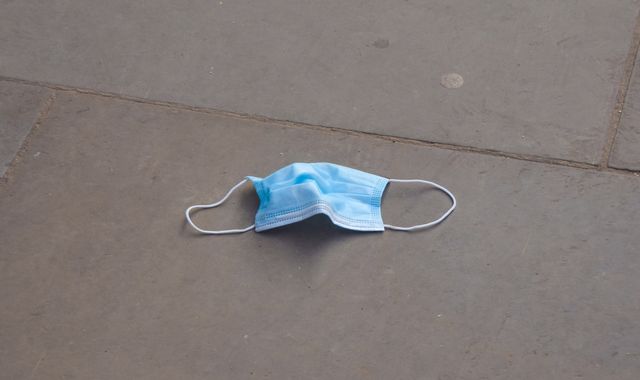‘Grenfell tower debris still falls into my garden’
Written by News on 11/06/2018
As the first anniversary of the Grenfell tower fire approaches, living in the shadow of the block is still a harsh reality for the people of North Kensington.


Piers Thompson lives on the estate opposite Grenfell tower. He, his wife and his daughter watched as the fire gripped the building in June last year, and his daughter lost friends in the tragedy.
A year on, his daughter, now 14 years old, is on antidepressants. She and his wife, as well as a lodger who lives with them, are all having serious counselling.
With the tower block standing over the community, he tells Sky News of his difficulty deciding what should happen next, and the pain his daughter must relive every time debris lands in their garden.
We live just at the foot of the tower. On the night, there were four people in the house. We woke up about 1.10am, when the fire was beginning to take hold.
I shouted and got everyone up, including my 13-year-old daughter. We stared mesmerised and aghast as it burned.
Since then we have had a mausoleum at the end of the garden.
On the one hand, that tower and the fact it’s there shows a need for justice.
On the other, it is very difficult to live with a burnt out building on the other side of the railway line.
People see it every day.
:: Hundreds of children struggling with trauma of Grenfell
Although it’s a large part of our lives, sometimes it dominates too much and you wish you could go back to being a happy community that managed, just about, and bumbled along.
During and after the fire there was an adrenaline surge – there was so much going on.
There was a police cordon to get into our house, there were meetings and marches.
A year later, we don’t have that going on, and we have more time to reflect on the tragedy and think about how nothing has happened.
My lodger, my wife, my daughter and I were in that night.
The fire really blew that lid right off any underlying issue you had hidden before. I suppose that is what post-traumatic stress disorder (PTSD) is.
All the other members of the household, apart from me, are having regular, quite serious, counselling. My daughter is on antidepressants.
We are coping.
We still meet on street corners and talk about wanting to see justice, and the anniversary.
Walking past the memorials and the burnt out building on the way to school every day, if you are six, seven, that is a big blight on your childhood.
Everyone around here knew someone in the tower. We shared the same shops and pub as the tower.
My daughter knew one girl who died well, and two or three others from school. They went through the added trauma of school moving into another school’s building, and then into a new building.
Can they go back with the tower standing next to it? There are many reasons why not.
If they wait for the tower to come down, that’s three years in a temporary school.
There is a bit of me that thinks the tower should have been left, as a monument to those who died.
But the general feeling is that wouldn’t be right. But it has taken quite a long time to put up the scaffolding, and now the finishing touches with the heart banners are going up.
To an extent, it could have happened anywhere, but I think there are reasons why that building was particularly vulnerable and this council was particularly callous to those ordinary people who lived there.
We have to deal with it, we do our best to cope.
In the neighbourhood in the last three to four weeks the mood has been peculiar.
Everyone is on edge, there have been fights and bar room brawls. I think we are all being drawn to think about the events of that night as we approach the anniversary.
We have something to fight for, with the inquiry going on. We want to make sure people are held to account.
But it is a blight on the neighbourhood.
My daughter, now 14, tries not to think about Grenfell at all. She takes a route back from school to see as little of it as possible.
But a bit of the insulation came down recently into our garden, because of a big wind. My daughter who is much more affected in many ways, hates that sort of thing.
On the night of the fire, it was like a plastic volcano exploded.
There were bits of cladding and charcoal floating into the garden, onto the roof, up and down the street.
On the night, someone’s homework floated into our garden. It was spooky.
My wife still has a burning sense of injustice, but also, of “can we move on?”.
There are people coming out of the tower realising they will be defined by this probably for the rest of their lives.
We are very concerned about my daughter. We aren’t really sure how we take her off antidepressants.
In the immediate aftermath there was a vacuum. No one seemed to know what to do.
The NHS does seem to have got its act together and going around trying to help people.
But I know there are people who haven’t come out since then, who haven’t responded.
My daughter went through a period of being in a dark place. Some of it was the fire, some was it exacerbating what she already struggled with as a teenager.
Her dark feelings have subsided now.
After the fire, there were the questions about whether the building was safe. You’re looking at the tower and wondering if it falls how fast and how far do you have to run.
Coping is, in a way, all we can hope to do.
Everyone wants to see justice done. We want to see some perpetrators locked up, and that will be kind of closure then.
It is important for us that it is not forgotten.
I will be on the silent march on Thursday. Thinking about those we have lost, contemplating, it gives you energy.
We have a strong sense of community and this makes us stronger and stronger.
(c) Sky News 2018: ‘Grenfell tower debris still falls into my garden’







